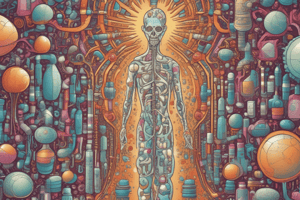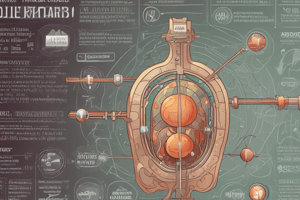Podcast
Questions and Answers
Metabolism activates the administered dose of parent drug and increases the effects on the body.
Metabolism activates the administered dose of parent drug and increases the effects on the body.
False (B)
Cytochrome P450 enzymes are responsible for the biotransformation of less than 50% of all drugs in clinical use.
Cytochrome P450 enzymes are responsible for the biotransformation of less than 50% of all drugs in clinical use.
False (B)
Age is not a factor that affects drug metabolism.
Age is not a factor that affects drug metabolism.
False (B)
Enzyme induction always leads to decreased drug metabolism.
Enzyme induction always leads to decreased drug metabolism.
The kidneys are not a site where drug excretion occurs.
The kidneys are not a site where drug excretion occurs.
Only one site is responsible for drug excretion.
Only one site is responsible for drug excretion.
The rate of blood flow to a tissue does not affect the entry rate of a drug into that tissue.
The rate of blood flow to a tissue does not affect the entry rate of a drug into that tissue.
Only bound drugs are active and distributed in the body.
Only bound drugs are active and distributed in the body.
Lipoprotein is the most important protein involved in the binding with drugs in plasma.
Lipoprotein is the most important protein involved in the binding with drugs in plasma.
The extent of binding of drug to plasma proteins is in the order of Globulins > Lipoproteins > α1-Acid glycoprotein > Albumin.
The extent of binding of drug to plasma proteins is in the order of Globulins > Lipoproteins > α1-Acid glycoprotein > Albumin.
Drugs do not begin to break down until they reach their target site in the body.
Drugs do not begin to break down until they reach their target site in the body.
Warfarin is not highly protein-bound.
Warfarin is not highly protein-bound.
Morphine has less efficacy than aspirin.
Morphine has less efficacy than aspirin.
Therapeutic index is related to the therapeutic window.
Therapeutic index is related to the therapeutic window.
Furosemide has less capacity to eliminate salt and fluid from urine than metolazone.
Furosemide has less capacity to eliminate salt and fluid from urine than metolazone.
A small dose of paracetamol requires to produce an analgesic effect.
A small dose of paracetamol requires to produce an analgesic effect.
Biliary excretion or fecal excretion takes place in the lungs.
Biliary excretion or fecal excretion takes place in the lungs.
The therapeutic window is the range of drug concentration that works well.
The therapeutic window is the range of drug concentration that works well.
Study Notes
Drug Metabolism
- The majority of small-molecule drug metabolism occurs in the liver by cytochrome P450 enzymes.
- Metabolism converts the initial (parent) compound into metabolites, deactivating the administered dose and reducing the effects on the body.
- Factors affecting drug metabolism include:
- Age: impacts liver function, with the elderly having reduced liver function and newborns having immature liver function.
- Genetics: impacts metabolism rate.
- Disease: impacts liver function.
- Species differences: affects metabolism.
- Heredity: affects metabolism.
- Sex: affects metabolism.
- Pregnancy: affects metabolism.
- Environmental factors: affects metabolism.
- Drug dose: affects metabolism.
- Enzyme induction: increases drug metabolism.
- Enzyme inhibition: decreases drug metabolism.
- Diet: affects metabolism.
Cytochrome P450 (CYP450)
- Responsible for the biotransformation or metabolism of about 70-80% of all drugs in clinical use.
Excretion
- The process of removing drugs and their metabolites from the body, usually through the kidneys (urine) or in the feces.
- Three main sites of excretion:
- The kidney: most important site, excretes through urine.
- Feces: excretion through the gut.
- Lungs: excretion through anesthetic gases.
Distribution
- The process of drug distribution affects how much drug ends up in active sites, influencing drug efficacy and toxicity.
- Factors influencing distribution:
- Blood flow.
- Lipophilicity.
- Molecular size.
- Interaction with blood components, such as plasma proteins.
- Examples of plasma proteins that bind to drugs:
- Human serum albumin.
- Glycoprotein.
- Lipoprotein.
- α, β, and γ globulins.
- Only free drugs are active and distributed.
Therapeutic Window
- The drug concentration range that works well, with a lowest level (Minimum Effective Concentration, MEC) and a highest level (Minimum Toxic Concentration or Maximum Tolerated Concentration, MTC).
- The therapeutic index is a measure of the therapeutic window.
Efficacy and Potency
- Efficacy: the maximum effect a drug can produce, with morphine having more efficacy than aspirin.
- Potency: the dose required to produce an effect, with morphine being more potent than Paracetamol.
Studying That Suits You
Use AI to generate personalized quizzes and flashcards to suit your learning preferences.
Description
This quiz covers the pharmacokinetics of drugs, focusing on the processes of absorption, distribution, metabolism, and excretion. It explores how these processes affect drug efficacy and toxicity.




